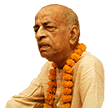Transcendental Literature - an essential subject: Difference between revisions
(Created page with "Category:Essential Subjects <!----------------------- edit below this line -----------------------> <!------------------------ begin introduction text below --------------...") |
(Vanibot #0041: Moves Choose Another box to the end) |
||
| Line 2: | Line 2: | ||
<!----------------------- edit below this line -----------------------> | <!----------------------- edit below this line -----------------------> | ||
<!------------------------ begin introduction text below ------------------------> | <!------------------------ begin introduction text below ------------------------> | ||
Anyone may read Bhagavad-gītā or the Śrīmad-Bhāgavatam repeatedly throughout his whole life and yet find in them new light of information. Mundane news is static whereas transcendental news is dynamic, inasmuch as the spirit is dynamic and matter is static. Those who have developed a taste for understanding the transcendental subject matter are never tired of hearing such narrations. One is quickly satiated by mundane activities, but no one is satiated by transcendental or devotional activities. Uttama-śloka indicates that literature which is not meant for nescience. Mundane literature is in the mode of darkness or ignorance, whereas transcendental literature is quite different. Transcendental literature is above the mode of darkness, and its light becomes more luminous with progressive reading and realization of the transcendental subject matter. The so-called liberated persons are never satisfied by the repetition of the words ahaṁ brahmāsmi. Such artificial realization of Brahman becomes hackneyed, and so to relish real pleasure they turn to the narrations of the Śrīmad-Bhāgavatam. Those who are not so fortunate turn to altruism and worldly philanthropy. This means the Māyāvāda philosophy is mundane, whereas the philosophy of Bhagavad-gītā and Śrīmad-Bhāgavatam is transcendental. | |||
Srila Prabhupada's books, lectures, conversations and letters offer a comprehensive presentation of this essential subject as seen in the Vaniquotes '''[[Vaniquotes:Category: | Srila Prabhupada's books, lectures, conversations and letters offer a comprehensive presentation of this essential subject as seen in the Vaniquotes '''[[Vaniquotes:Category:Transcendental Literature|Transcendental Literature]]''' category. An introduction from his books is given below in the following 8 quotes. | ||
<!-------- end introduction text and don't touch next three lines ---------> | <!-------- end introduction text and don't touch next three lines ---------> | ||
---- | ---- | ||
== Quotes from Srila Prabhupada's books == | == Quotes from Srila Prabhupada's books == | ||
<!----------------- edit quote boxes below this line -----------------> | <!----------------- edit quote boxes below this line -----------------> | ||
{{VaniQuotebox| | {{VaniQuotebox|At the end of every chapter, the author admits the value of the disciplic succession. He never claims to have written this transcendental literature by carrying out research work|At the end of every chapter, the author admits the value of the disciplic succession. He never claims to have written this transcendental literature by carrying out research work. He simply admits his indebtedness to the notes taken by Svarūpa Dāmodara, Raghunātha dāsa Gosvāmī and other authoritative persons. This is the way of writing transcendental literatures, which are never meant for so-called scholars and research workers. '''(Caitanya-caritāmṛta, Madhya-līlā 8.312)'''}} | ||
{{VaniQuotebox| | {{VaniQuotebox|By broadcasting the holy name and fame of the Supreme Lord, the polluted atmosphere of the world will change, and as a result of propagating the transcendental literatures like Srimad-Bhagavatam, people will become sane in their transactions|By broadcasting the holy name and fame of the Supreme Lord, the polluted atmosphere of the world will change, and as a result of propagating the transcendental literatures like Śrīmad-Bhāgavatam, people will become sane in their transactions. While preparing this commentation on this particular stanza of Śrīmad-Bhāgavatam we have a crisis before us. Our neighboring friend China has attacked the border of India with a militaristic spirit. '''(Śrīmad-Bhāgavatam 1.5.11)'''}} | ||
{{VaniQuotebox| | {{VaniQuotebox|By submissively hearing this transcendental literature, one can attain the full pleasure of his heart's desire. But one must be very careful to hear the message from the right source|By submissively hearing this transcendental literature, one can attain the full pleasure of his heart's desire. But one must be very careful to hear the message from the right source. Śrīmad-Bhāgavatam is exactly received from the right source. It was brought by Nārada Muni from the spiritual world and given to his disciple Śrī Vyāsadeva. The latter in turn delivered the message to his son Śrīla Śukadeva Gosvāmī, and Śrīla Śukadeva Gosvāmī delivered the message to Mahārāja Parīkṣit just seven days before the King's death. '''(Śrīmad-Bhāgavatam 1.1.3)'''}} | ||
{{VaniQuotebox| | {{VaniQuotebox|For critical students of mundane poetry and literary men without God consciousness who are after bodily sense gratification, there is no need to read such a high standard of transcendental literature|For critical students of mundane poetry and literary men without God consciousness who are after bodily sense gratification, there is no need to read such a high standard of transcendental literature. Persons who are after sense gratification should not try to imitate rāgānuga devotional service. The songs of Caṇḍīdāsa, Vidyāpati and Jayadeva describe the transcendental activities of the Supreme Personality of Godhead. '''(Caitanya-caritāmṛta, Ādi-līlā 13.42)'''}} | ||
{{VaniQuotebox| | {{VaniQuotebox|If one is actually sincere in writing, all his ambitions will be fulfilled. Whether one is known as a great author is incidental. One should not attempt to write transcendental literature for material name and fame|One should not ambitiously think, "I shall become a great author. I shall be celebrated as a writer." These are material desires. One should attempt to write for self-purification. It may be published or it may not be published, but that does not matter. If one is actually sincere in writing, all his ambitions will be fulfilled. Whether one is known as a great author is incidental. One should not attempt to write transcendental literature for material name and fame. '''(Caitanya-caritāmṛta, Ādi-līlā 9.5)'''}} | ||
{{VaniQuotebox| | {{VaniQuotebox|If we read the entire Bhagavad-gita every day, all eighteen chapters, in each reading we shall find a new explanation. That is the nature of transcendental literature|In the śāstras—the purāṇas and other Vedic literatures—there are so many narrations describing the transcendental activities of the Supreme Personality of Godhead, and everyone should hear them again and again. For example, even if we read the entire Bhagavad-gītā every day, all eighteen chapters, in each reading we shall find a new explanation. That is the nature of transcendental literature. '''(Śrīmad-Bhāgavatam 7.14.8)'''}} | ||
{{VaniQuotebox| | {{VaniQuotebox|In the Vedic literatures it is stated that the import of all transcendental literature is revealed to one who has unflinching faith in the Supreme Lord and his spiritual master|It appears from the talks of Lord Caitanya that a person who cannot keep his faith in the words of the spiritual master and who acts independently cannot attain the desired success in chanting Hare Kṛṣṇa. In the Vedic literatures it is stated that the import of all transcendental literature is revealed to one who has unflinching faith in the Supreme Lord and his spiritual master. Lord Caitanya firmly believed in the statements of His spiritual master, and He never neglected the instructions of His spiritual master by stopping His saṅkīrtana movement. '''(Teachings of Lord Caitanya, Chapter 19)'''}} | ||
{{VaniQuotebox| | {{VaniQuotebox|Krsna consciousness preachers should give more stress to the sankirtana movement, especially by distributing transcendental literature more and more. This helps the sankirtana movement|Śrī Caitanya Mahāprabhu set a practical example in that He did not establish any temples or Deities, but He profusely introduced the saṅkīrtana movement. Therefore Kṛṣṇa consciousness preachers should give more stress to the saṅkīrtana movement, especially by distributing transcendental literature more and more. This helps the saṅkīrtana movement. '''(Śrīmad-Bhāgavatam 7.14.39)'''}} | ||
<!----------------- edit quote boxes above this line -----------------> | <!----------------- edit quote boxes above this line -----------------> | ||
''' | '''Transcendental Literature - [[Vaniquotes:Category:Transcendental Literature|explore more within this category]]'''. | ||
{{EsentialSubjectTotal}} | {{EsentialSubjectTotal}} | ||
<div style="float:left;"> | |||
{{EssentialSubjectnav}} | |||
</div> | |||
__NOTOC__ | __NOTOC__ | ||
__NOEDITSECTION__ | __NOEDITSECTION__ | ||
Latest revision as of 17:57, 22 November 2020
Anyone may read Bhagavad-gītā or the Śrīmad-Bhāgavatam repeatedly throughout his whole life and yet find in them new light of information. Mundane news is static whereas transcendental news is dynamic, inasmuch as the spirit is dynamic and matter is static. Those who have developed a taste for understanding the transcendental subject matter are never tired of hearing such narrations. One is quickly satiated by mundane activities, but no one is satiated by transcendental or devotional activities. Uttama-śloka indicates that literature which is not meant for nescience. Mundane literature is in the mode of darkness or ignorance, whereas transcendental literature is quite different. Transcendental literature is above the mode of darkness, and its light becomes more luminous with progressive reading and realization of the transcendental subject matter. The so-called liberated persons are never satisfied by the repetition of the words ahaṁ brahmāsmi. Such artificial realization of Brahman becomes hackneyed, and so to relish real pleasure they turn to the narrations of the Śrīmad-Bhāgavatam. Those who are not so fortunate turn to altruism and worldly philanthropy. This means the Māyāvāda philosophy is mundane, whereas the philosophy of Bhagavad-gītā and Śrīmad-Bhāgavatam is transcendental.
Srila Prabhupada's books, lectures, conversations and letters offer a comprehensive presentation of this essential subject as seen in the Vaniquotes Transcendental Literature category. An introduction from his books is given below in the following 8 quotes.
Quotes from Srila Prabhupada's books
Transcendental Literature - explore more within this category.
Vanipedia has now over 903 introductory articles compiled from Srila Prabhupada's books under the series titled Essential Subjects. All these articles can be seen in the Table of Content on the right side of this article and also here in this Umbrella Category. Browse through them to relish the breadth and depth of Srila Prabhupada's teachings - There is a subject for everyone.






